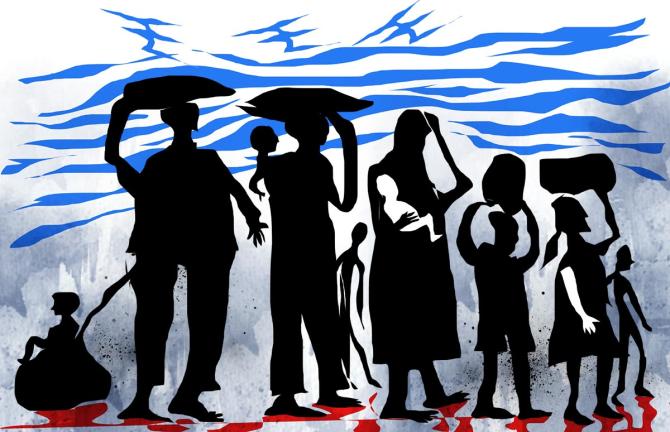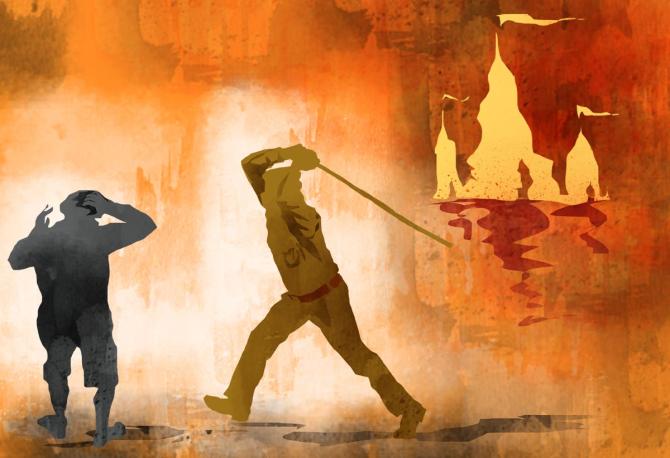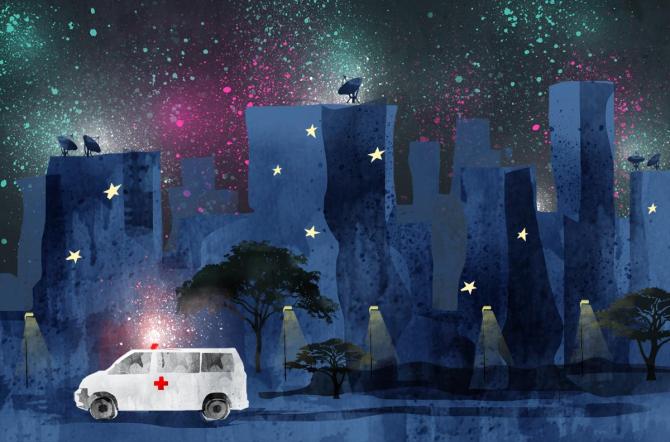Sure we understand that isolating affected communities is part of the pandemic protocol, but we don't wish our life and freedom to be tossed aside at the slightest excuse, states Shyam G Menon.

As we transit from 2021 to 2022, our shared wish is: Let the new year not be like the one gone by or the year before that.
Both 2020 and 2021 were hammered by COVID-19.
Towards the end of 2021, the world was in the grip of the Omicron variant of the virus causing the pandemic. We step into 2022, cautiously.
However, it would be incorrect to heap all the blame for muted celebration, on the virus.
The harassment and havoc it unleashed, assumed the proportions it did because of human-induced factors as well.
The business of caring
Among our worries regarding any disease has been fear of severe infection, cost of medicines, and hospitalisation.
It turns the spotlight on our healthcare infrastructure; makes us question its emergent style of evolution influenced in no small measure by money.
Traditionally described as a medium of exchange, money is now a way of thinking. You imagine monetarily.
Early March 2020, when the great Indian lockdown was still some days away, an employee at my local bank branch asked, "Which stocks do you think will be the best bet in times of pandemic?" The spread of the disease had become an occasion to invest in companies benefiting from related business opportunities.
Much the same way, our proliferating numbers, and crowded, congested life push up apartment prices that can then be indirectly reaped by investing in real estate companies.
During the pandemic months, the stocks valued so spanned healthcare to pharmaceutical companies to any enterprise catering to the human being stuck in a new lifestyle of work from home.
Over time, the monetary paradigm breeds an irremovable cynicism; a feeling that everything is run by money and smartness by money.
Adding to the cynicism is the growing polarisation of income and thereby, the polarization of smartness.
There have always been poor people. Except, being poor today is to also suffer the in-your-face display of their capacity to afford by the world's rich.
This prism hasn't spared how we view our healthcare apparatus – the trio of hospitals, insurance companies, and pharmaceutical companies.
The more these services have transformed into cold business models, the more they feel distanced from the actual intent of healthcare, which is to help the distressed.
When testing, treatment, and cure become expensive, the human being worries that much more about falling ill. It isn't the disease you fear but the medical bills.

On the other hand, courtesy their strength in terms of capital and influence, the ability of these business models to shape our healthcare infrastructure to their preference, has grown.
Add to it, the pandemic's ritual of repeated testing for the virus, getting admitted to regular hospitals and field hospitals, quarantining at hotels if you are traveling, the multiple vaccines against COVID-19 on offer, the multiple rounds of vaccination recommended, and the emergent official conclusion that none of the vaccines prevent infection but only tone down the severity of disease; you cannot fault people for speculating wildly about what the hell this pandemic is or has become.
Had the healthcare business been firmly rooted in easy access, affordability, transparency, and above all, service, then public trust in it -- including trust in pharmaceutical companies -- would have been higher.
But for that to happen, the monetary imagination of existence shouldn't be so overwhelming. COVID-19, a disease on a global scale, is a wake-up call.
The agendas of authority
The other factor that made 2020 and 2021 tough, is the rise of authoritarian governments.
That is politics, what has it got to do with COVID-19? -- You may ask. Let me explain.
Authoritarian governments know they are unpopular, especially when they manifest as aberrations in democratic countries.
Notwithstanding their choreographed displays of confidence, they are deeply insecure entities.
Allergic to criticism, they push their critics too into the same edgy mold; each loathes and fears the other.
Consequently, informed reasoning takes a back seat in both rulers and opposition.
At ground level, this competition translates into a contest over who keeps COVID-19 case numbers lowest when actually, it isn't the numbers that matter as much as disease-severity, its impact on healthcare infrastructure, and potential fatality.
Against this backdrop of over-simplified benchmarks, lockdowns have become a subject of concern.
Whenever data shows infections picking up, governments hint at imposing restrictions.
It is well-meant but suspicions about the government's intent arise when the general ambiance is one of authoritarian rule and opaque agenda.
After all, any restriction imposed, disempowers the individual and strengthens governance by authority and instruction.
We forget that empty streets, people indoors and economic activity suspended is not what governments are elected to do.
Sure, we expect them to keep us safe, sure we understand that isolating affected communities is part of the pandemic protocol, but we don't wish our life and freedom to be tossed aside at the slightest excuse.
Governments should not become trigger-happy on restrictions.
One evening, an elderly three-wheeler driver in my neighborhood, told me, "Omicron is meant to keep us indoors so that they can complete big projects smoothly."
It made no sense. But I heard him out and reminded him gently alongside of a thing called science. He seemed to need somebody to talk to. So, we chatted.
Ride over, when he collected his money and took leave, I too missed someone to talk to.
For some of us, particularly the older lot, the daily reporting of infection numbers, the stigma still attached to infection, and the Damocles Sword of restrictions and lockdown it inspires, has become an unending tunnel of gloom.
If a healthy mind and body are important to ward off disease, then gloom and depression don't contribute to good health.

As with healthcare, what we sorely miss in this restrictive mindscape is a human concern. If our law enforcement agencies were reasonable and not the lathi-swinging sort, if they were the type we could approach and talk to if our administrators understood that we have to get on with our lives despite the pandemic, if they realised that making a stigma of infection only catalyses non-disclosure -- if this was the case, we wouldn't suspect official intentions so much.
But the trust has been damaged thanks to the Indian weakness for authoritarianism.
How for instance, do you explain authorities penalising walkers and joggers (this was in the early days of lockdown) when it was known that exercise augmented immunity and a good immune system was the need of the hour?
Worse, in the shadow of authoritarian government and misery by pandemic, the clamor for pilgrimages and political gatherings, has continued.
There have been attempts to fan communal tensions for electoral gain.
When these work to the advantage of those in power, freedom becomes praiseworthy. When it doesn't, curbs seem apt medicine.
Either way, such extremes endorse further the belief in select quarters that restrictions on our freedom, are apt.
For them, lockdown assumes the value of killing two birds with one stone -- it checks the spread of infection, confines people indoors, and reduces the public chaos of our existence.
It also resonates well with the Indian style of being brought up: Do as you are told.
Lockdown is actually a pandemic-specific intervention. In our hands, it becomes a tool to ration freedom.
The virus is only a virus; the rest is us
December 31, 2021. The night was quiet; one of the most peaceful countdowns to New Year I have experienced.
From about a week earlier, various states in India had begun imposing restrictions citing Omicron.
Infection numbers were steadily increasing; severe disease and hospitalisation credited to the variant weren't yet reported.
Many people were sniffing and coughing, it also being the colder part of the year with smog to boot.
How much of that sniffing and coughing is due to the virus, how much isn't? Tests will tell.
And if it is the virus at work, should I fear it excessively if the disease stays light? All I know is -- the virus has nothing to do with either the healthcare system we designed to heal us or the governments still making examples of those getting infected. Both are human creations, reflections of us.
At least a portion of the blame for how painful 2020 and 2021 were, rests on us.
Shyam G Menon is a Mumbai-based columnist.
Feature Presentation: Rajesh Alva/Rediff.com










